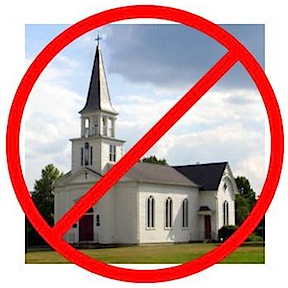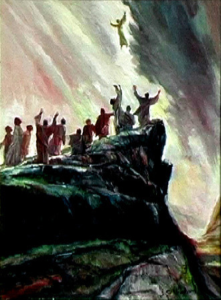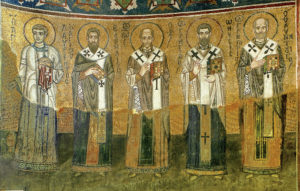 Nearly everybody defines sin as breaking a law or disobeying a set of rules. But in Jesus’ timeless story about the two lost brothers in Luke 15, our Lord shows us it’s possible to perfectly obey all the regulations and still be trapped in sin. Both the younger son and the older son had faulty hearts. One ran away from the father’s house and disobeyed all the rules while the other son stayed at home with the father and kept all the rules. But they both resented the father’s authority. They both looked for ways to get out from under his command. They each tried to tell the father what to do and how to run his business. One rebelled against the father by being very bad. And the other rebelled against the father by being really good.
Nearly everybody defines sin as breaking a law or disobeying a set of rules. But in Jesus’ timeless story about the two lost brothers in Luke 15, our Lord shows us it’s possible to perfectly obey all the regulations and still be trapped in sin. Both the younger son and the older son had faulty hearts. One ran away from the father’s house and disobeyed all the rules while the other son stayed at home with the father and kept all the rules. But they both resented the father’s authority. They both looked for ways to get out from under his command. They each tried to tell the father what to do and how to run his business. One rebelled against the father by being very bad. And the other rebelled against the father by being really good.
Sin destroys relationships. No matter what the sin is or what motivates it or who commits it, sin destroys relationship. Neither of the sons wanted the father; they each wanted what the father could give them. They wanted the father’s blessings, they wanted his riches, but they didn’t necessarily want him.
Like the lady talking about her husband and says, “I didn’t want to marry my husband for his money, but I couldn’t see any other way to get it!”
Sin breaks fellowship with the people in your life and with God. Sin wrecks that bond. Remember Adam and Eve hid from God, God didn’t hide from them. The separation doesn’t come from God’s side. The sin and shame and guilt creates the barrier. But even with the sin, God is still reaching out, he’s still seeking that fellowship.
A lot of people think God won’t associate with sinners, that God separates himself from sinners. No, God went out looking for Adam and Eve, right? “Where are you? What’s going on?” Our God walks with Enoch, he shares meals with Abraham and Moses, he dwells inside the tabernacle in the wilderness and inside Solomon’s temple in Jerusalem. Sin breaks relationship with God; but that’s always on the sinner’s end, not God’s.
God restores those broken relationships. Sin breaks and destroys and separates. But God in Christ came here to the sinners to find what is lost, to heal who is sick, and to fix what is broken. God’s mission is to restore the relationships, to reconcile all sinners back to himself. And he came here in the flesh and blood of Jesus to show us what it looks like.
Notice that at the beginning of Luke 15, Jesus is hanging out with sinners. That really ticks off the religious leaders who think God’s people shouldn’t have anything to do with sinners. But hanging out with sinners — eating and drinking with sinners, talking to and sharing with sinners — seems to be God’s strategy for restoring the relationship.
And sinners love it!
All throughout the Gospels, sinners are attracted to Jesus. Sinners are gathering around Jesus, they’re following Jesus, they can’t get enough of Jesus. And Jesus welcomes them. He eats with them. Exactly like the master of the banquet in the last story Jesus told in Luke 14. God’s strategy is a table. And God is bringing all people to that table. God wants all people to have fellowship with him. Table communion. A righteous relationship with God.
All people.
Even sinners? Yes! Even tax collectors? Yes! Prostitutes? Yes! Blue Jays fans? (……)
Yes, even Blue Jays fans and politicians and bank robbers and murderers and cheats! Everybody is invited! And God himself comes to us to demonstrate in living color what it looks like.
Jesus seeking out sinners and getting to know them. Jesus hanging out with the lost. Peter saw it up close as an apostle of the Messiah and he tells Cornelius in Acts 10:
“I now realize how true it is that God does not show favoritism but accepts people from every nation… God anointed Jesus of Nazareth with the Holy Spirit and power and he went around doing good… because God was with him.”
No wonder the sinners and tax collectors loved him. Jesus went about doing good because God was with him. Jesus loved them! He accepted them! And it seems like he actually enjoyed their company. Jesus was good to sinners. Jesus showed mercy and compassion to sinners. Jesus shared his great joy and peace with sinners. And the religious people didn’t understand it. They wrinkled up their faces and called Jesus “a friend to sinners.” And Jesus said, “Thank you very much!” That’s the nicest thing you can say to our Lord.
What if we had the same reputation? What if we were known for hanging out with sinners? What if people criticized us because we showed so much mercy and compassion to sinners? What if our churches were known for sharing joy and peace with sinners?
Peace,
Allan











Recent Comments